#in fact i think their should be more narratives about relationships not working out and that being a good thing in the long run
Text
Bing-ge and Victim's Entitlement as Portrayed by MXTX
I was thinking about Bing-ge’s journey as an abuse victim into an abuser and how much the creation of Bing-mei is a critique on both the writing trope that creates Bing-ge as well as the societal expectations that drive it.
In the world of PIDW, one of Shen Yuan’s main critiques was about how terribly the young Luo Binghe is treated by the narrative, so much so that he views it as torture porn. From being abandoned as a baby, to being abused as a servant and watching his adoptive mother wither from sickness and die, to finding his way to Cang Qiong Mountain and suffering under a cruel shizun who then pushes him into hell, Shen Yuan finds all this unnecessarily cruel. However, Shang Qinghua knows that the trauma Luo Binghe suffers directly correlates to the enjoyment readers are meant to get out of the second half of the protagonist’s life when he becomes overpowered and primed for vengeance. Shen Yuan knows this, too, as this is the trope he girds himself with as Shen Qingqiu to work up the nerve to push his disciple into the Endless Abyss, to “earn” his happiness. However, is this a true happiness? Does the trauma justify any and all of Luo Binghe’s actions?
On the surface, Bing-ge seems happy! He is able to enact revenge on Shen Jiu—and demolish Cang Qiong Mountain Sect who acted as accomplices to his abuse—and was given narrative access to any and every woman of marriageable age who crossed his path. He is even able to destroy his world by merging the three realms with no consequences to himself. Bing-ge has seemingly reaped the twisted “reward” that having survived unconscionable abuse and abandonment from the time of his birth had sown for him, and PIDW readers were able to enjoy and defend Bing-ge’s later megalomaniacal actions directly because they had read through hundreds of pages of his ill-treatment beforehand. The worse Luo Binghe’s childhood was, the more they were willing to accept of his actions in adulthood. We see a similar thing take place in the SVSSS fandom: the reveal of Shen Jiu’s past as a child slave is used to justify his later abuse of his child disciples—children who had no hand in his trauma but who he has decided to bear the brunt of it, anyways. But Shen Jiu lived a very unfulfilling adulthood due to his unwarranted actions until his untimely death. Is Luo Binghe any different?
Enter Bing-mei: the revised protagonist who abandons revenge in pursuit of experiencing genuine affection from the only person who gave it unconditionally. No, Bing-mei doesn’t get all the girls or all the power. He does not become the emperor of all three realms and he is not an uncontested leader that all conscious beings bow to. In fact, he is very tame and controlled in comparison to his PIDW counterpart despite not having complete control of his sword that amplifies his negative emotions. But when Bing-ge slips into the world of SVSSS and discovers that, despite all of this, Bing-mei has an intact world, platonic relationships, and a shizun who loves him, he’s willing to throw it all away to experience that same life. Bing-ge is revealed to be the unhappy, unfulfilled one, because the one thing he wanted—genuine unconditional love—was the one thing that he cannot earn or forcibly take. No amount of audience hype can change the fact that Bing-ge must leave behind the happy Bingqiu couple to return to his destroyed world in his unsatisfying reality.
This isn’t just a theme in SVSSS, either; it’s present in all of MXTX’s works in how people—both characters and the irl fandom—react to antagonists and asshole characters who have experienced trauma. In mdzs: a female cultivator tries to say that Jin Ling endangering other cultivators should be forgiven “since he’s an orphan.” Jiang Cheng throws his parents’ and sister’s death around to justify being an unrepentant serial killer. Jin Guangyao cries about how much his father hates him compared to the legitimate Jin heirs that he murdered. In tgcf: Qi Rong escapes discipline at every turn because his mother had to escape with him from his abusive father, and Mu Qing’s transgressions against the marginalized are ignored because “he was poor, once.” All of these characters have their actions whitewashed both in their stories and by their fandoms at large because their defenders believe that their trauma excuses any of their subsequent behavior.
Yet, MXTX does not prescribe to this idea. Notice the pattern of how the above characters end their stories. Jiang Cheng tanks his reputation and loses the respect of his only living relative. Jin Guangyao and Qi Rong die. But Jin Ling experiences setback after setback until he adjusts his behavior, and Mu Qing had to earnestly apologize under harrowing circumstances to be forgiven. It is not characters who seek justice for being harmed who are punished in these novels but those who persevere in their entitlement to do whatever they want because they were once harmed, thereby eventually destroy any goodwill others, particularly their loved ones, had towards them. The characters who are able to contain their actions to aim only at those who wronged them or else honestly reflect on their sense of entitlement in order to change for the better become well-liked by their peers. And as for Bing-ge: his inability to change within the narrative of PIDW may have “earned” him all the material things his world could offer and the affections of an unseen audience, besides, but he misses out on true human connection and love. These are the things he can never forcibly take, because in real life, no amount of trauma would entitle him—or anyone—to those things.
454 notes
·
View notes
Text
To Ragh; or, On Fatness
Hi! Below is an actual play mini-essay. These are written as part of a personal writing practice of thinking critically about actual play. I hope you find this reading engaging and know that all I write reflects my own interpretations rather than as an official representation/canonization of these shows. Keep reading for my interpretation of Ragh Barkrock's fatness as part of queer representation in Dimension20.
Ragh Barkrock may be one of the most beloved NPCs in Dimension20. It would be easy for Ragh, a bloodrush player good enough to potentially play professionally, to be presented as hypermasculine. In fact, the freshmen year art for Ragh, when he was antagonist rather than beloved ally, showed him in a muscular, inverted Dorito shaped body typical of a jock.
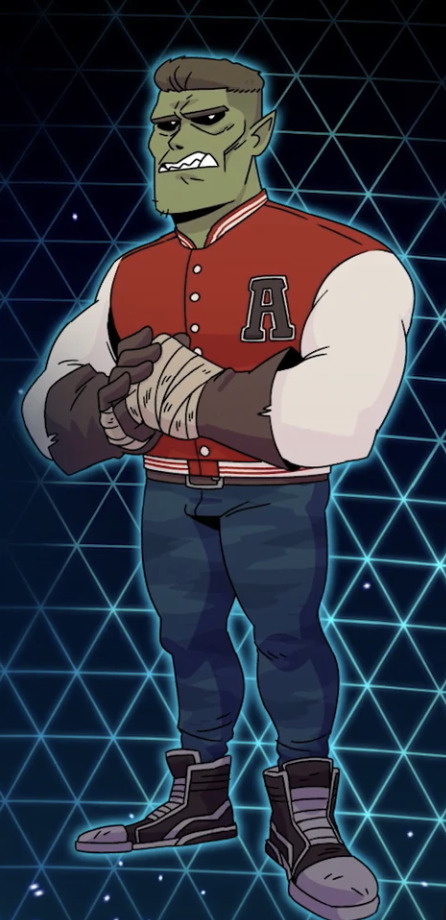
He's, obviously, built, and his cut jaw and cheekbones only bolster that image. As Ragh comes to terms with being gay at the end of Fantasy High, his countenance changes. When we see him again, the new art reflects a chubbier, happier Ragh.
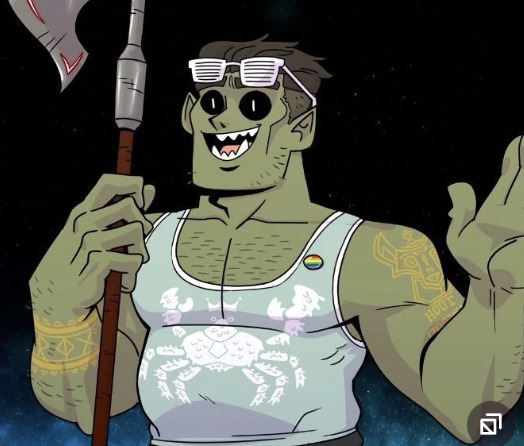
The show aligning weight gain with acceptance and happiness already works against prevailing stereotypes that use weight loss as a quick metaphor for improving yourself and being the "real you." Moreover, connecting Ragh's acceptance of his sexuality with what seems like a larger comfort in his own body is a strong indictment of hypermasculine gay culture. As Gabriel Arana writes, gay men "must reconcile their sense of masculinity with their failure to conform to its heterosexuality." Not doing so has negative mental health outcomes, as Arana points out, and contributes to a culture that devalues fat queer people (see the popular "no fats, no femmes, no Asians" that often is touted in masculine gay subculture).
All of this, I think, is why Ragh's art for Junior Year was particularly impactful for me as a fat queer person. If being a gay man (or half-Orc, in Ragh's case) means having to situate your life in relationship to failing compulsory masculinity, then it seems there is an inherent queer aspect to embracing, celebrating, and showcasing a beloved NPC in an explicitly fat and happy body.

FHJY Ragh art by @caitmayart
Ragh is still strong and he is still fat. His body radiates a commitment to the power of fat bodies to exist in spaces they are often violently unwelcome in, such as gyms. Existing in gyms and sports spaces as fat people means dealing the "impossible standard that rejects nearly all of us" and upholds a diet culture rooted in impossible, Eurocentric and colonial body standards. In TTRPGS or actual plays, there is a unique opportunity to think about how bodies might exist in worlds different from ours, to imagine bodyminds as otherwise. However, as queer critics like Paul Preciado have noted, sci-fi and fantasy representations of cyborgs and other transformative bodies often lean into "fixing" disabled people or moving gender nonconforming bodies more easily towards technologies upholding a normative standard rather than questioning the standard all together.
Spyre is a world that deals with similar issues to ours, even without direct one-to-one correlations, so it, too, is a place where the narrative and artistic choices should be examined in how it helps us interpolate the world the audience resides in. From the Applebees cultish adherence to a deity-based nationalism to the various representations of parental neglect and abuse and every side story in-between, Dimension20's flagship show does not shy away from difficult realities even when recasting them through fantasy. Ragh, as a half-orc gay son of a disabled single mother, then, I see the arc his fat body goes through as meaningful and intertwined with his self-acceptance and queerness. He moves away from the toxic masculinity engineered into his blood rush team to instead pursue coalition comraderie with his friends to the point that he and his mother end up joining a communal living situation with those friends and their parents. Ragh's body expands as his family does, as his ties to community do, and to me, the gift of his fatness is the invitation to expansion that it holds out to us as viewers.
#dimension 20#actual play#fantasy high: junior year#fhjy#fhjy spoilers#ragh barkrock#lydia barkrock#brennan lee mulligan#emily axford#lou wilson#zac oyama#siobhan thompson#ally beardsley#brian murphy#riz gukgak#kristen applebees#fabian seacaster#adaine abernant#gorgug thistlespring#figeroth faeth
235 notes
·
View notes
Text

Don't Fear Criticism
Creating homosexual characters can feel like planting an active grenade in the middle of your story. You start to fear bad reception of your work - even before you start!
But really, there is no need to worry. The fact that you're concerned only proves that you care.
You probably won't get it the first time.
You probably will get some criticism.
Only remember that it's perfectly normal to make mistakes. After you punch out your draft, have beta readers who are part of the community and incorporate their feedback.
No Diversity Shopping
Yes, diversity is important, but it's no checklist where you need to list all possible sexual orientations and have at least one character for each.
First of all, it would be quite impossible.
Second, that is likely to make all of them underdeveloped and stereotypical.
Check if you really need the character in your plot.
If they turn out to be homosexual, let them run their own course and shape their path. If your story's theme is related to the character's sexuality, think about the message you want to convey.
Quality over quantity, always.
Go Beyond Sexuality
Your characters exist, and they happen to be homosexual, not the other way around. This doesn't mean that it won't be an important, or that you should downplay their sexuality.
Strike a balance by showing readers their hobbies, interests, likes and dislikes, relationships with their family and friends, etc. The more holistic they are, readers are going to be convinced that you have an actual character, not a scarecrow holding up the #diversity tag.
How do their sexuality play into their broader narrative?
Develop a Backstory
Every homosexual character must have thought about their orientation and identity, with a process of how they came to recognize their sexuality.
Whether you're character is a confused teenage girl, or a middle-aged gentleman with a stable relationship, think about what brought them here.
Backstories don't have to be tragic. They can have supportive parents and find escapism in online communities who accept them for who they are.
There isn't just one "gay life". Get creative.
Normalization is Important
Sometimes, your story world will not accept homosexual people as normal. That's okay!
However, there is a difference between other character treating them unfairly and you as an author normalizing homophobia in your narrative.
Word choice and tone would play a key role.
When a likeable character is homophobic, avoid normalizing it by making it a flaw. Show that your conservative medieval village is narrow-minded when they treat them as outcasts.
Homophobes may not necessarily be the evil guys.
It's enough to state (clearly) that it's wrong.
Make Use of Tropes
Stereotypes aren't just an issue with gay characters, but when used successfully, have created wonderful retellings and spinoffs that are refreshing.
You can purposefully overplay stereotypes to show how silly they are. Deconstructing stereotypes can add humor to your narrative.
You can also use them to explore the expectations that readers have for those kinds of characters. The Gay Best Friend might be a trope, but you can get them to go deeper than the typical sidekick to realize their true potential as a cast member.
Religion and Homosexuality
In the real world, religion and homosexuality are often presented on far opposites of politics, and that makes me sad. Homosexual characters are free to be religious, find peace, support and mindfulness through any religion of their choice.
Vise versa, deeply religious characters can have wonderful relationships with homosexual characters.
It all comes down to how your characters interpret religion and homosexuality in light of those religious values. Though I'm an atheist, I believe all religions have the ability to embrace diversity at their core.
If you like my blog, buy me a coffee☕ and find me on instagram! 📸
#writer#writers#creative writing#writing#writing community#writers of tumblr#creative writers#writing inspiration#writeblr#writing tips#writers corner#writers community#poets and writers#writing advice#writing resources#writers on tumblr#writers and poets#helping writers#writing help#writing tips and tricks#how to write#writing life#let's write#resources for writers#references for writers
201 notes
·
View notes
Note
youve mentioned offhand ur issues with thirsty sword lesbians, have u talked at length abt this somewhere before and if not do u want to? i want to hear ur thoughts hehe
now before i get into this i want to clarify: i like thirsty sword lesbians, overall! i think it takes some of the best stuff from monster hearts and refines it -- i think it does great and exciting things with pbta playbooks -- i think anyone making a pbta game should check it out because it's full of valuable ideas -- and i've had a lot of fun playing it!
however, i think it's just as flawed as it is brilliant. there's a few different flaws but the biggest one for me is a catastrophic clash between two things the game is trying to be. one on hand, it wants to be a catradora rpg. there's no shame in that, i love games that wear their influences on their sleeves--TSL¹ wants to be a game about kissing your rival after you've both been disarmed, about having a fraught and complicated relationship with your girl best friend who abandoned you to serve the dark lord, about having homoerotic sword duels where your blades lock and you stare into each other's eyes for just one second too long before one of you kicks the other in the chest. i think that's an admirable goal for an RPG and one that TSL hits a lot of the notes of--the fact that the move to "Figure Someone Out" has special questions you can only ask someone when you're duelling them is incredible design. the Strings system, adapted from Monsterhearts, the ability to fluster your enemies when you use the Entice move, the constant focus on what characters desire and how their actions conflict with those desires--so much of the game is working towards that!
unfortunately, the game also wants to be about queer resistance to homophobia and capitalist/imperialist hegemony. this is clear in its sample settings, with their eyerollingly on-the-nose conflicts like defending 'queertopia' and fighting the evil sorceress 'repressia'. but much more importantly, it's clear in the game. several of the playbooks are defined by their relationship to sexual hegemony--the beast is about someone who is othered and monsterised for expressing their existence and the seeker is about someone sheltered and prejudiced moving past that and discovering themselvs and others. like, it's not subtle--
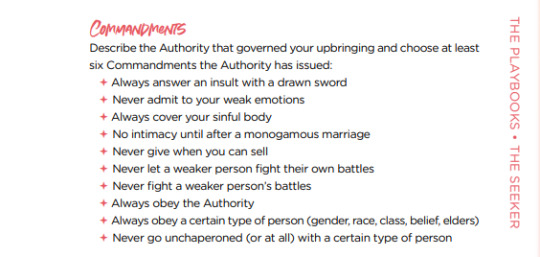
and to be clear, there's nothing wrong with that, either. just as i like a lot of TSL's swashbuckling girl-romancing flirting-at-swordpoint mechanics, i really appreciated how (although the game's outlook on what these forces are is predicably liberal and its tonal approach to these things is one that i personally find teeth-grindingly insufferable) these things are actually integrated into its mechanics. playbooks like the beast and the seeker (and the rest!) imply something about the world the game is set in and its sexual politics. this game is meaningfully queer in the way something like dream askew is, in that its mechanics ask you to actually explore your character's queerness specifically. this is good, and it's something that elevates it above about 90% of ttrpg stuff that sells itself as queer.
so if both these things are good, what's the problem? well, it's that they're two great (or at least--interesting) tastes that go fucking horribly together. the fundamental problem that i have with TSL and one that i think takes a lot of work to get around in your own campaigns is that it simultaneously wants you to be fighting (on the individual level) a lot of antiheroic ultimately sympathetic hot girls you can flirt with and kiss--a lot of 'i can fix her's or 'she can make me worse's--and on the broader narrative wants you to be fighting institutional queerphobia (and often, although this is nowhere near as actually supported by mechanics, a more generalized 'imperialism' or 'capitalism' or 'bigotry'). so you end up fighting 'those stupid sexy homophobes'--people who are according to the text (not just 'lore', but the rules text, the mechanics you're playing with!) simultaneously the violent enforcers of cisheteropatriarchy and a bunch of fuckable lesbians with sympathetic backstories.
& i just think those things are fundamentally at odds. the result is a game that if you try and play it at face value works at cross purposes with itself, attempting to do two perfectly valid things without considering what happens when the streams cross.
it also has a few other flaws--like many other PBTA games, its balance falls apart if you play any long campaign (my group and i had to figure out special alternative level-up rewards!) but it comes with no inbuilt way to neatly conclude a campaign or character. its tone is something that, as i often mention, i absolutely cannot fucking stand--it has a certain sense of humour that feels profoundly dated to me and was never my cup of tea when it was in vogue. this is something i try not to hold against the game bc it is very much a personal taste-level 'cringe' reaction but the game lays it on pretty fucking thick.
more to its detriment, it is profoundly, gratingly liberal in the exact way people who deploy that tone usually are. its understanding of anything outside queerphobia specifically is just a purely aesthetic & thoughtless 'imperialism is bad!'. it manages a more nuanced understanding of homophobia, but it only manages it on the individual level--for a game about queerness and about fighting systems of cisheteronormativity, it has no systemic or material understanding of these systems and no interest in establishing one.
and finally--and this is just one paragraph but it's so fucking awful i feel the need to complain about it here because i think about it often as an example of something i never want to write:

this sucks! real bad! so deeply fucking silly to reassure people in your game that you called Thirsty Sword Lesbians that it's okay if you want to be cishet. like, it would be one thing to make a game where you can neatly extract the lesbianism and have the same game, a surface-level aesthetically queer game with no actual interest in queerness except as a marketing term. it would fucking suck but this paragraph would at least describe such a game. but TSL isn't that!!! . 'thirsty sword cishets' would be a very different and much worse game! awful and self-defeating paragraph. deeply silly concern to address and give airtime to. i didn't buy a game called 'thirsty sword lesbians' to be told 'its okay to be heterosexual i pwommy'
so yea just to reiterate: i like the game overall, i think there's a lot of good valuable stuff in there designwise despite all this. but i'm very ambivalent about it--ironically, i feel a love-hate relationship with this game about love-hate relationships. i admire it and yet i despise it! i long to put it at the tip of my sword and slowly tilt its cover up so that the pages look up at me coquettishly but with burning anger in their page numbers. if this book was a person id hatefuck it, is the joke, thats the joke im making, here, in this post. thanks
¹ i call it TSL whenever i can because the name 'Thirsty Sword Lesbians' makes me cringe out of my fucking skin. genuinely horrible name. i'm sure it's funny the first time you hear it, i got a mild chuckle the first time i heard it to, but it's such an obnoxious thing ot have to say repeatedly when seriously discussing it. should have stayed a placeholder name amiguitas
219 notes
·
View notes
Text
Me adding my two cents is probably not gonna do much, but here I go, I guess:
I want to preface this with saying that Wilbur's content and Lovejoy have been incredibly important to me and I've put a lot of time, effort and money into supporting Lovejoy especially. So finding out about this, before finding out about the details, I had originally reacted with incredulous derision of twitter stans. And then erring on the side of caution about how things developed.
At this point there's almost no question that it's Wilbur, for the simple reason that Shubble would have cleared up his name if it wasn't. There's no way she would throw someone innocent under the bus, if she knew somebody else was guilty. Additionally, not a single person in Wilbur's surroundings has disputed any claims and have only narrowed it down further towards Wilbur. At this point it is incredibly unlikely she is talking about anybody else.
I do want to take a moment to comdemn those (mostly on twitter) who used this opportunity to dig into both Shubble and Wilbur's private lives, trying to construct a narrative of her abuse and in some cases going so far as doxxing Wilbur. It is entirely possible to support Shelby and condemn her abuser, without invading their privacy and endangering people's lives. Shelby's goal was to warn people and to make them more aware of the signs of abuse. As well as make it as clear as possible, who she's talking about without saying who it is directly, for a meriad of possible reasons. It was not an invitation to write abuse fanfiction about her private life.
That being said, the way I will feel about this in the long run will depend heavily on how Wilbur deals with this situation. I will definitely distance myself either way (slowly but surely), but his reaction to this will influence how I will act moving forward.
Should he stay silent or respond with insincerity/derision/defensiveness/etc., then that's it for me. Fuck him.
But should he come forward, own up to it, apologize and prove that he is working on himself, then I might be able to find it in myself to give him a second chance over time. I just don't believe that doing bad things makes you irredeemable forever and ever and ever.
We know for a fact that Wilbur has been struggling with mental health problems for most of his teen and adult life and from his solo music we are also aware that he is incredibly aware of the fact that he is the problem in his relationships. Expressing dark thoughts in music, does not automatically mean somebody is abusive. In fact, creating dark art is an excellent way to deal with harmful thoughts and impulses. I have literally never taken his lyrics to mean that.
However, his lyrics in YCGMA and MSR have always been incredibly autobiographical and do show that he is acutely aware that he's the unhealthy element in his unhealthy relationships.
We also know directly from him, that he has distanced himself from most of his social circle and sought out therapy as recently as 2 weeks ago in an effort to improve his mental health.
This does not excuse his actions whatsoever. Mentally ill people are still responsible for the harm that they cause and Shelby is unbelievably brave to tell their story. I hope they finds peace, I hope she has all the support she could ever need and I hope she has achieved her goal of making people more aware of how people end up in situations like this. She is an inspiration for standing up for herself like this.
But I also think that, should Wilbur come forward, admit to his wrongdoings and prove over time that he is working on becoming a better person, friend and partner, that he does not have to be shunned forever and ever and ever. He has a long life in front of him and I hope both for him and all his future friends and partners that he manages to find a healthy, happy way of living. This can happen, even while he never bothers Shelby, or the other people he hurt, again.
This is a best case scenario. I do think he is allowed to take some time to formulate a response. A hasty response to situations like this have never helped anyone ever, neither the victim, nor the accused. Taking his time to come to terms with the situation, which surely came as a shock, and to really think about how he wants to deal with this situation is much better than him writing a twitlonger as soon as he finds out.
Either way, I will distance myself from him and Lovejoy, slowly but surely. I won't get rid of the merch clothing I own because it was quite expensive and throwing it away is a waste of perfectly good clothing, but I won't find the joy I once felt wearing them. (I am salty about me being gone from home for a few months and having ordered Lovejoy merch, which had been waiting for me for weeks and then finding out about this literally the day I travelled back. It definitely felt weird as hell to unpack that stupid NORMAL longsleeve with his fucking face on it, while being hurt and confused and angry.)
Listening to Lovejoy's music, likewise, will never feel as euphoric as it once did, even if I go back to it. Which really sucks cuz they genuinly hit my sweet spot in music taste. YCGMA and SISV specifically, have been so, so important to me and removing them from my listening rotation i going to Hurt.
Interestingly, I don't feel quite as terrible as last time I had to suddenly cut a content creator out of my life. So I guess practice makes perfect lmao.
I don't know if me writing and posting this had any point. I guess I just wanted to get it off my chest and maybe it resonates with somebody.
Anyway, take care of yourselves. Take it easy and try to focus on other things, if this hit you hard (ideally offline). Try to meet with friends, maybe play some boardgames (or video games), go for a walk,read a book, have a coffee with a loved one. There's joy in the world, despite it all.
85 notes
·
View notes
Text
Okay, spoilers for the first twenty minutes of the first episode of the live-action ATLA remake, because they added a brand new prologue that was VERY bad and I need to talk about how hilariously bad it was.
So, the show opens in the Fire Nation's Capital City at night, with an earthbender running away with an important-looking scroll and being chased by Fire Nation soldiers. There's an unimpressive chase sequence that ends with the earthbender managing to hand off the scroll to someone else, before being caught and dragged before Fire Lord Sozin.
First thoughts: why are they opening 100 years early? I liked the way the original cartoon opened in the actual world state that mattered to us, then the war and its history slowly unfolded as the main characters learned more about their own world. Sozin's wig and costume looks CHEAP, and they are throwing away all of the intimidating mystery of the Fire Lord (we don't see Ozai's face in the cartoon for like two seasons) by showing Sozin as just some guy. Also, it's kind of a waste of time to introduce Sozin here at all, especially in person, because while he had a MASSIVE impact on the world of the story, he's basically irrelevant to the main narrative happening 100 years later, because our actual villains are his descendants ACTIVELY CONTINUING his work.
The earthbender is beat-up but defiantly says that the Earth Kingdom has now been warned that Sozin intends to attack. Sozin is all smug, though, because apparently he WANTED these plans to be stolen. He wants everyone (he actually explicitly names the Water Tribes and the Air Nomads as well as the Earth Kingdom) to be looking towards the Earth Kingdom, so that he can attack the Air Nomads instead, because that's where the new Avatar is, who is the only person who could stop him. (The exposition is sooooo clunky and cheesy. It's baaaaad. Talk directly to the camera, why don't you?) Then Sozin burns this poor earthbender to death and then the scene skips over to Aang at the Southern Air Temple.
Second thoughts: oh, so we're not only going to waste time building up Sozin as a villain when we're going to very shortly skip ahead 100 years? We're also going to establish Sozin as a guy in a bad costume who is kind of shit at military strategy? He doesn't need a distraction! He doesn't need a feint! No one is expecting him to attack anyone, he shouldn't need to fake attacking someone else! In fact, he's letting all the other nations know that they should be paying close attention to his movements? What?!
At the Air Temple, we see Aang and Gyatso's relationship, and we see Gyatso called in to speak with a council of senior monks. The council has been alerted to the fact that Sozin intends to attack the Earth Kingdom, they intend to help, and they want to prepare Aang for war. And I didn't really have to think too hard about the logistics of Sozin's attack on the Air Nomads when it was something that happened 100 years ago! But now this stupid fucking show is making me actually have to think about how all of this worked, because it actually shows SOZIN'S ATTACK on this temple and this is why Aang is forced to leave! (And gets frozen in an iceberg for 100 years.)
Don't show me this nonsense if you don't want me to think about the logistics and strain my suspension of disbelief! If the Air Nomads intend to help the Earth Kingdom when the Fire Nation attacks, then because they're PACIFISTS who can FLY, they would be most helpful serving as scouts and messengers. But NO ONE is watching the movements of Sozin and his entire fucking army of firebenders when they have been EXPLICITLY forewarned that he intends to attack the Earth Kingdom??? They don't have anyone watching out for this explosive conflict that will directly impact their ability to travel at the very least?
It's one thing if the Fire Nation has simply become increasingly militaristic and industrial, because from an outsider's perspective, that could just be Sozin strengthening his internal power. (The Fire Nation could have had multiple lords and kingdoms, historically, before being forcibly united into a single nation.) Chin the Conqueror was also just one Avatar ago, so it's maybe not unreasonable for the Fire Nation to be wary of warmongers within the Earth Kingdom. The Fire Nation becoming increasingly hostile and aggressive is concerning, but people tend to hope that cooler heads will prevail and war won't happen. It's not the same as DIRECT CONFIRMATION that the (United?) Fire Nation intends to invade the Earth Kingdom and start a war?
Sozin, apparently: "The best way to pull off a surprise attack is intentionally put all of my enemies on their guard."
So, now the Air Nomads don't look great for failing to notice an army showing up like that. Especially if they're in contact with the Earth Kingdom about the war that they're anticipating? Like, sure, they didn't anticipate THEY would be attacked, but they have information now that Sozin has an army on the move and terrible ambitions? Maybe these senior monks aren't sharing the news around because they don't want to panic anyone yet? Maybe it took a long time for the Earth Kingdom's information to reach them? But it's not a great look that the show is immediately inspiring me to find flaws (in the plan of telling your enemies to look out for your attack beforehand) and to have to come up with excuses for these potential plot holes.
And I personally didn't enjoy seeing the Air Nomads engaged in combat with the Fire Nation as one of the first things we see from them! Of course they're going to defend themselves when attacked, but it's just so sad, especially when Aang is introduced in the original cartoon as a wondrous mystery to Sokka and Katara and the audience, fun-loving and bright and with incredible powers, a miraculous shock of sunshine colors against the blue of the South Pole, a person from a more peaceful time and a hopeful way of life, someone who has never seen war and never heard of this one. In the cartoon, we learn about the Air Nomads through getting to know Aang, this penguin-sledding kid who can't even conceive of war yet, before we see the remnants of his loss. We don't have to see airbenders fighting for their lives and dying horribly before we fully understand who they are as a people.
This remake heavily frontloads its exposition with new material that is painfully clumsy, largely irrelevant, and doesn't add anything good to a story that's already been done pretty well. Was this just an attempt to avoid being accused of directly copying and adding nothing? Because it was bad. What the fuck was wrong with opening in the main time period of our story with Sokka and Katara as our POV characters? We could have instead seen more of the Southern Water Tribe! We could have spent more time with Aang getting to know the Southern Water Tribe and bonding with Sokka and Katara! We could have had more conflict between Aang and Zuko (who is, unlike Sozin, alive and relevant to the actual story at hand)! But no, we cut good stuff from the original show and have to waste all of this time on Sozin instead, who is dead by the time that the real story starts, and also apparently thinks telling everyone he intends to attack the Earth Kingdom when no one knew he was going to attack anyone is good military strategy.
81 notes
·
View notes
Text
But FWIENDSHIP!!!! 🥺🥺🥺🥺🥺🥺🥺
Okay, so you all know how I get when something gets stuck in my head, but yesterday I saw a post talking about how Katara and Zuko's potential romance messes with their friendship, and I don't understand how, but that's beside the point. This is an anti-Kataang post.
I will once again admit that I don't spend a ton of time in Kataang/anti-Zutara spaces (cause I'm respectful like that), but every so often, I see one of those takes pop up in my safe area (because respect isn't always a two way street, unfortunately). It's interesting to see how many times this take seems to crop up. Katara and Zuko falling in love would ruin their friendship, yet those same people fail to acknowledge that Bryke went ahead and ruined their friendship anyway out of jealousy. These same people also tend to hold Kataang as a prime example of Friends to Lovers, the only problem is, Aang isn't Katara's friend at any point.
Throughout the series, it's made very clear that Aang likes Katara, but for most of the series (until literally the last few seconds, in fact) it's also clear that Katara only sees him as a friend. This should have been an object lesson that sometimes crushes don't work out, but friendship can be stronger than temporarily disappointed feelings. However, that's not what we get. Aang doesn't care about Katara's friendship. He doesn't want Katara in his life unless it's in a romantic capacity. We see it in how he reacts when he feels romantically rejected (lava fissure, EIP). The narrative doesn't give Katara any space to say no to Aang without it permanently damaging their relationship, because they never had the relationship Katara thought they did. Katara thought she was Aang's friend, but for Aang, their 'friendship' was just a precursor to romance. In this, the year 2023, I know we all understand why this is a problem.
Aang can't even conceive of a world where Katara does turn him down. He dreams about her enthusiastic response to his declaration of love; he assumes that since they kissed he kissed her and staked his claim, they should be together, despite there never being any sort of conversation, and the fact that the one time he did try to talk about it, she changed the subject very quickly. Katara's feelings are an afterthought for Aang, which is terrible for any relationship, but particularly in a romantic one. There is never a moment where Aang puts Katara's emotional needs ahead of his own. He never puts a value on her platonic friendship. There's never a moment where he decides that despite his feelings for her, having Katara in his life as a friend is better than not having her at all. That moment should have happened regardless of whether they ended up together or not, because friendship is the most important component of the Friends to Lovers trope.
By comparison, the friendship Katara eventually forms with Zuko is much deeper, and based on a mutual respect, understanding and emotional support for each other. This is a fantastic foundation for a romance, although bafflingly, people who laud Katara and Zuko's deep friendship don't seem to agree. Them potentially falling in love doesn't cheapen their friendship because they actually were friends first. On top of that, their Enemies to Friends journey ending romantically would not only not cheapen their friendship, it would tie into the themes of the show beautifully (the illusion of separation; love being stronger than hate; learning to respect other people's differences etc).
Let's be real, what Kataang actually represents is The Hero Gets the Girl, and I think deep down we all know that, even the ones calling it Friends to Lovers. In the Hero Gets the Girl trope, the Girl in question doesn't really matter. She's less of a romantic partner and more a prize for the Hero saving the day. Her emotional journey to falling for the Hero mostly plays out off screen, even though she may not have even liked the Hero like that initially, and the hero doesn't ever show that he respects her as a person. For the most part it works (arguably) because the Girl isn't a character in her own right, she's just part of the Hero's story. The reason it doesn't work with Kataang is that Katara is a character. She does have her own journey, and as passionate and outspoken as she is in pretty much every other aspect of her life, it doesn't make sense for her journey to falling for Aang takes place largely off screen. Not unless you understand how little Katara's feelings matter to their relationship. Had Katara actually rejected Aang, their friendship would have ended because Aang was never interested in her friendship.
It's interesting to me to see people who claim to value friendship over romance spend more time complaining about a romance that isn't canon over the actual canon ship that really does cheapen the friendship. But then again, I guess that was never the problem in the first place.
#atla#anti aang#anti kataang#zutara#enemies-FRIENDS-lovers#that would have been worlds better than the Hero Gets the Girl ship masquerading as a friends-lovers romance#if you prefer platonic zutara that's fine#but let's not pretend that the problem is that their potential romance would spoil their friendship#not when you don't speak about how the actual canon ship completely devalued katara's friendship towards aang#be so for real#just say you don't like zutara and keep it pushing#because now the argument just looks hypocritical when you have nothing to say about kataang#the actual canon ship devaluing both friendship and consent#THE YEAR OF CONTENT!!!!
344 notes
·
View notes
Text
We Must All Get Louder and Gayer About La Pluie Immediately
I understand that this show only airs on iQIYI and that most of us canceled that after KinnPorsche and/or Love in the Air, but I’m gonna need y’all to re-up those subscriptions and get on this train right now. This and Step By Step have been some of the most intriguing romance explorations we’ve had in the realm of Thai BL in a long time, and you are missing out on this incredibly breakdown of the soulmate and fast romance tropes that I’ve ever experienced.
I’ve seen some consternation about whether this show is honoring or defying conventions within romance and BL, and I don’t think that’s the most enjoyable way to engage with a piece of media in a mature genre. I think it’s more useful to ask questions like:
How is this show using those conventions?
What do these conventions fit?
What new things have we learned about ourselves or the genre as a result?
We’ve been unpacking the soulmate idea from the very beginning (@lurkingshan). The show upended our expectations about that from the opening scenes by showing us a romantic man who doubts in his own romantic destiny because his parents divorced. The show has then gone on to state quite plainly that it believes that the hearing loss connection is entirely coincidental, and that what people do in their relationships with other people is what matters the most.
We are sitting in the audience, and so we know that this is a romance. We fully understand that Tai and Patts will more than likely be together at the end of this story. What that knowledge and expectation allows the show to poke at the development of relationships in dramas. The characters are in a slow burn romance, but everyone in their lives doesn’t think they should be! That’s been incredibly fascinating because we so often see BL characters rushed into a relationship with each other that we are always surprised when they aren’t (Bad Buddy, My School President, Bed Friend). It’s been incredibly enjoyable for me to see a romance refuse to rush their characters into commitment with each other.
My good friend @lurkingshan wrote about this subversion of tropes and expectations this morning as they pertain to Lomfon. She makes the point that we expected Lomfon to be a bigger factor going into episode 7 than he was, and that’s also I think part of the point. He’s not a threat to the core romance, but he does have a role to play in this story. For me, I think he’s here to reinforce that skepticism and doubt are critical to making any sort of relationship or belief system function. Your ability to handle new challenges and things that confuse you are critical to being able to maintain a commitment. It doesn’t work if it’s forced.
As for misunderstandings, this show also continues to be intentional about this. As far back as episode 4, Dream chided Patts for not making things clear with Nara. Patts listened but hoped that his non-answer would be enough for Nara. Likewise, Bow has warned Tai twice about Lomfon’s clear desire for him, and how by not making things clear Tai may also face difficulties.

This comes to a head this week with Nara. I agree with @ginnymoonbeam that Nara’s return lets the narrative blow up Tai’s uncertainties he’s left bubbling since the beginning. I personally love Nara’s reintroduction here because Tai is romantic and because he genuinely seemed to like Nara. He liked that she still knew how to take care of her ex. He liked the determination she showed to travel all the way to Chiang Mai to pursue him. He was rooting for her! Even if he misunderstands the kiss, it’s not really about the kiss. It’s about the fact that someone he admires cares for Patts, and he likely worries that he’s the reason they didn’t work out. He’s also still questioning if the mutual attraction between himself and Patts can be trusted.
Moving on to the intimacy, I wrote last week about the way this show has made it clear that these are two men interested in each other. Following up on that this week, we entered an incredible liminal space in their relationship. Patts signaled earlier in the episode when they first got to their room that he is hoping to pick up where they left off with their last intimate moment. Both went into this bed fully aware of the sexual tension between them.
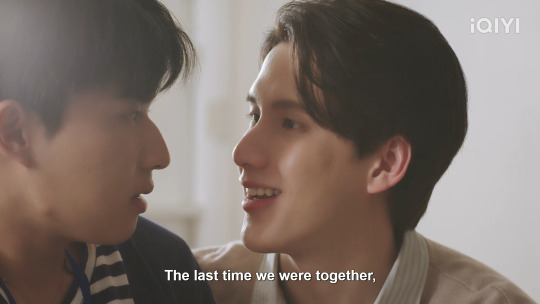
Tai is the one who opens the door this time by first offering the massage and then initiating the kiss. Things heat up between them, with Tai again on top to remain in control of the situation, something @shouldiusemyname points out here. Tai once again asks Patts to stop when he moves to escalate the encounter, but Tai shows Patts that he is interested in him. He offers to help him out by performing the act that Patts was most certainly going to do last week. This is incredibly fascinating for me, because I have always asserted that bottoms are the ones in most control of an encounter. I do not read Tai choosing to take care of Patts as him giving up control in any way. In fact, it’s a way for him to further maintain it. He reassures Patts that he is happy to be here and lets them release the tension of the moment.
Also, I just absolutely lose it over the lip flick.
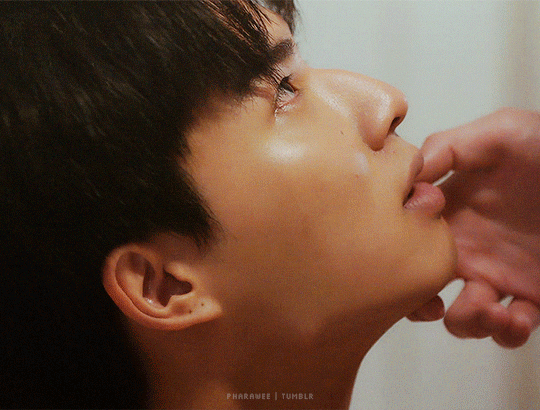
gif by @pharawee
Once again, I cannot overstate how radical it is for me to see a show saying that the one performing the act is the one in control of the encounter, and has the character who’s feeling unsure use that as a way to explore their own feelings. Tai needed to know that he likes making Patts happy. Please list the other BLs that have done this with sex in the notes. It’s not very often we get this!
Also, look at this man. This is not the face of a man who is being coerced. This is the afterglow of two people navigating their intimate relationship (@ginnymoonbeam).
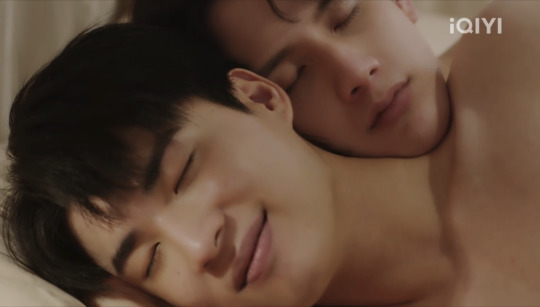
He’s literally rubbing his hand because as they spoon because he’s so relieved.
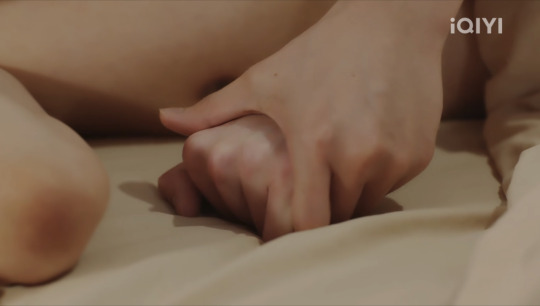
I also just absolutely love Patts. I love that he keeps leaving notes for Saengtai to make sure he knows where they are.

Look at him walking around the next morning. He seems pleased...like a man can seem pleased.

We just never get this kind of stuff in genre. This is a classic romance of the Nora Roberts variety that’s allowing us to show two men navigating their romance and intimacy on their terms while also showing that even fated mates must be good partners to each other. This is a story that loves romance and loves the conventions of the drama. It is approaching each thread with clear-eyed conviction, and we as queer viewers deserve this.
So, I’m going to need you all to get louder, weirder, and gayer about this show. We gotta get more people on this one. We can’t let this show be forgotten because it’s not on YouTube.
Once again, thank you for coming to my post.

tagging @wen-kexing-apologist and @kyr-kun-chan for all the conversation we’ve had about this show.
275 notes
·
View notes
Note
What are your ships for Batim? :D

VERY GOOD QUESTION- I know my answer should be rather straightforward but I feel I have to put some context to my answers since they may seem contradictory/paradoxical otherwise, so bear with me-
Sammy x Norman : Well. I think that one was pretty obvious, anyone who's seen more than 3 of my posts knows that I'd die for these two. They're just so PERFECT for each other, from their complementary personalities to the fact that their relationship allows us to delve deeper into batim's historical and social context. Sammy and Norman have one of the few relationships that develop the most during the game's lore : Norman originally complains vehemently about Sammy's frenetic behavior, only to end up lamenting to Buddy and Dot how 'Sammy isn't the same anymore'. What's interesting about this statement is that he says it in relation to Sammy's strange behavior : clearly, the two men have grown close enough for Norman to differentiate Sammy's extravagant habits from his ink-influenced behavior.
Furthermore, Sammy is a very gray character morally, a perfectionist who is extremely socially maladjusted (surely due to the fact that he's coded on the spectrum and autism wasn't properly diagnosed at the time), naturally ostracizing him. For his part, Norman comes from a rural background (which surely earns him the animosity of the people at the studio, given the historical context and the fact that he could very well be poc) and also seems ill at ease socially : to me, it's fascinating to see two characters excluded from their peers because of differences they can't change (being autistic or poc and gay) getting closer to each other, to the point where Sammy, who is deeply misanthropic, naturally compliments Norman by describing him as very bright. To me, Norman is the perfect partner for Sammy : ready to apprehend him as he is, since he's completely free of social conventions, without taking any shits from him.
I think Sammy and Norman can really get the best out of each other, during a historical period when being different was strongly proscribed. I think I'd have trouble enjoying Batim as much without their dynamic at its heart (considering how narratively rich it is) : Norman is Henry's confidant, Sammy is Joey's, both remain morally gray deuteragonists fundamentally opposed to the ink machine, while remaining fascinated by its powers. And who wouldn't love a good old enemies to lovers ending tragically with the unwitting murder of one by the other ? After all, Norman's main flaw is that he's too curious for his own good, and it was Sammy who inevitably led him to his doom..
Allison x Tom : what more can I add. She's everything. He's just Tom. I've always been drawn to characters/ships with a vibe completely opposite to the vibe of the work they originally came from, and the 'turning poison into positivity' energy that Tom and Allison bring to Batim has always fascinated me. In a world as tragic as their own, I find it touching to see these two find beauty in all the ugliness and manage to ask themselves 'what if we were happy after all ?' It's really striking and brings a narrative richness to the work, since they directly mirror what failed with Sammy and Susie : Allison is perfect, but that was never what was at stake in Tom's eyes. Tom was looking for humanity, not perfection, and he managed to go beyond the image of the muse to discover a friend, unlike Sammy with Susie. They're literally Romeo and Juliet but, well... Not dead.
Joey x Henry/Henry x Linda : oh boy. These three... Let me get it straight right away : Henry and Linda are perfect for each other. She's exactly what he needs to be happy : she's present, patient. There's no denying that he loves her immensely. But Joey... oh Joey is undoubtedly Henry's soul mate. The subtlety is that Joey can't bring him the stable happiness Linda can : Joey tugs at him, pushes him over the edge. He knows exactly what to do to push him beyond his own limits. The love Joey offers Henry is an uncomfortable but unconditional one, one that would allow Henry to go beyond what he thinks he's capable of achieving because no one knows Henry better than Joey ! And let's be honest, Batim only exists because Joey refuses to move on, to live his dream without Henry in it. He's stuck in unrequited love and refuses to learn to live with it. And that's the tragedy of this trio : Henry sincerely loves Linda but is truly himself with Joey, which prevents him from hating OR loving him (And Joey exploits this information by remaining extremely toxic and convincing himself that he can wear him down lmao). Henry is stuck with this dilemma : Existing peacefully with Linda or living painfully with Joey. And that's why I love the dynamic of this love triangle : because there are no solutions that will satisfy everyone.
Joey x Sammy : okay, don’t get me wrong : these two are HORRIBLE for each other. Does Sammy periodically want to quit just to piss Joey off? Yes. Isn't Joey's fascination with Sammy intimately tied to his refusal to forget Henry, who was a genius like Sammy? Yes. Nevertheless, it's impossible for me to read The Illusion of Living without feeling embarrassed and like I'm reading Joey's diary : whether you ship them or not, Joey is practically canonically smitten with Sammy. I sincerely don't think Joey and Sammy can sustain a healthy relationship with each other, but oh boy, surely that won't stop me from exploiting their bizarre obsessive love-hate relationship, where it's hard to determine whether they're going to throw hands or make out.
#oh god the normmy one I’M SO SORRY ANONS#I just love this ship so much I got carried away#anyway that’s just my own personal analysis#which are sometimes a bit far-fetched I admit#BUT STILL it’s so fun to over analyze batim when you know the creators really don’t give a shit about their own lore lmao#thank you so much for the asks anons :))#I hope my answer has enlightened you#sammy lawrence#norman polk#normmy#allison pendle#thomas connor#thomson#joey drew#henry stein#linda stein#creatorship#how do you call Sammy x Joey ??#jammy ? or is that the name for Sammy x Jack ?#god i dont know#susie campbell#(mentioned)#samsie#(derogatory)#batim#batdr#bendy and the ink machine#bendy and the dark revival#ask response#berlingot’s asks
90 notes
·
View notes
Text
No, George Lucas is not a "traitor"
You may have seen angry tweets and thumbnails such as these, in the last few days.
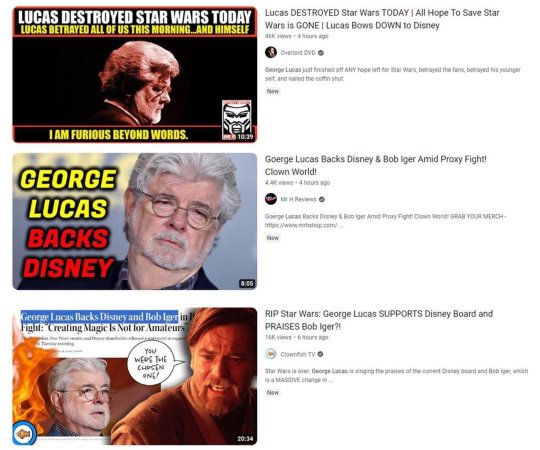
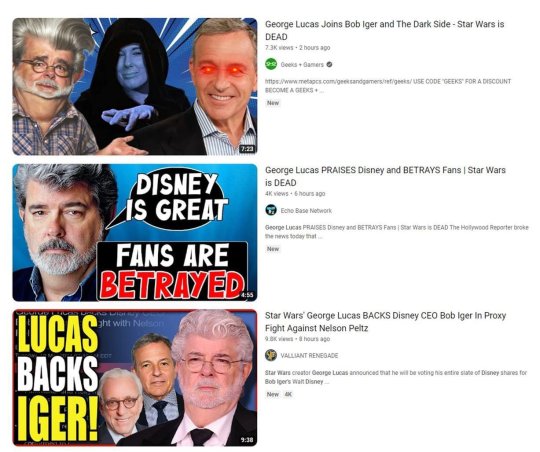
Context - Disney is going through a proxy battle, and George Lucas sent out a statement that read as follows:
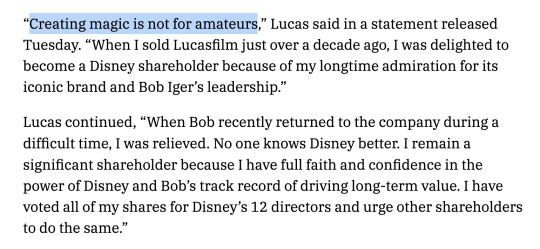
So immediately, all the grifting influencers who based their entire platform around the narrative that "Kathleen Kennedy & Disney betrayed Lucas' legacy" banded together and agreed that the new line was:
"Fuck George Lucas, he betrayed us and betrayed himself. Lucas sided with his own abusers!"
Here's why this line of thought is absolutely childish and uninformed.
1- Get real, he's a shareholder, of course he'll say this.
I don't need to expand on this, do I?
He owns stock. Someone threatens your money, you defend the money. The question becomes: why does he think that sticking with Disney CEO Bob Iger will result in more profit than siding with?
Variety theorizes that it may be because Nelson Peltz has admitted that he has no media experience.
And if that's the case? I'm not surprised at all, because...
2- George has always hated amateur studio execs
The following is me simplifying a lot... but George's relationship with studios has never been a good one.
When he was working at American Zoetrope, with Francis Ford Coppola, they were commissioned to adapt George's short film into a feature, THX-1138. The studio execs didn't like it and forced Francis to refund them the money (which is why he agreed to direct The Godfather, to get out of debt).
Moving on to American Graffiti (1973). When George writes Graffiti, he shops it around to studios and they all essentially told him to go fuck himself.
"American Graffiti went around to every single studio twice and they all said, "It's not a movie, there's no story, and there are no movie stars in it." And Star Wars— it was, "What in the world is this? Wookiees and robots? I don't get it." [...]
It'd be hard to make a movie [like American Graffiti or Star Wars] today in the system because all these middle management people get in there and interfere in the process. I think that's much worse for filmmakers than it's ever been in the past."
- Star Wars Insider #43, 1999
Except Universal. But throughout the process they're being irritants.
They object to the title because they don't know what it means.
The president is convinced it's a bad movie to a point where when he sees audiences cheer for it in test screenings, he argues they're paid actors.
They force Lucas to trim 5 minutes out of the film. Why? Just because.
This approach the studio execs were taking comes from the fact that none of them were artists. At this point in time, studios had been and were being bought by corporations who thought they could make a quick buck in the movie business.
Eg: Warner Bros wasn't run by the Warner brothers anymore. Paramount was now a subsidiary of Gulf+Western.
So when he's receiving notes, they're coming from - you guessed it - amateurs who think they know what they're talking about, but in reality have no clue. They did market research and think they know everything.
This subject is covered in The Offer (2022), a series about the making of The Godfather (reeeeally good show, I watched it twice).
In this scene, for example, you have a studio exec with no artistic sense whatsoever trying to tell Coppola which poster he should go with, and you get the idea of what I mean.
youtube
(Fun fact, a young George Lucas even makes a cameo in the pilot episode, in Coppola's office.)
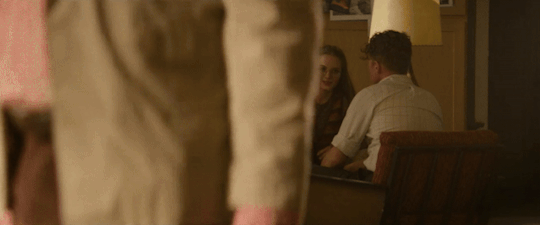
George also went into this subject during his 2015 interview with Charlie Rose.
It's a 4-minute clip, so here's the relevant bit:
"[Big corporations are] known for being risk averse. And movies are not risk averse. Every single movie is a risk, a big risk, like... The movie business is exactly like professional gambling... except you hire the gambler. You use some crazy kid with long hair, you give him $100 million and you say "go to the tables and come back with $500 million." That is a risk!
Now, the studios have been going to think of it that way, they say: "well, maybe if we told him that he couldn't bet on red, maybe if we told him because we did market research and we've realized that red wasn't" -- so they tried minimize their risk. [...]
They're basically corporate types. They think-- some of the worst things happens when they think they know how to do it, then they start making decisions that ensure it's not going to work. "
- Charlie Rose, CBS This Morning, 2015
Now, ironically, this is the same interview in which he compared Disney to "white slavers", but clearly he was still smarting from his own ideas for the Sequels having been ignored.
But considering how little a fuck he gave about those Star Wars films once they came out and how often he visits the now visits sets of like Ahsoka and The Mandalorian, I think he's over it.
Again, this doesn't align with some Star Wars influencers' narrative that "he's fuming, he hates these movies, he feels betrayed and angry!" But if you ask me, he likely couldn't care less, and dubbing Disney his "abusers" is giving them waaay too much credit.
He made his movies, told the story he needed to tell and is now probably just enjoying his retirement, raising his daughter and putting together his museum, part of which is possible because of the money Disney keeps generating for him, as an investor.
So it doesn't surprise me one bit that George Lucas, of all people, to side with the Devil he knows rather than the amateur exec, because the latter is a painful road he knows all too well.
53 notes
·
View notes
Text
Who or what is Maggie?
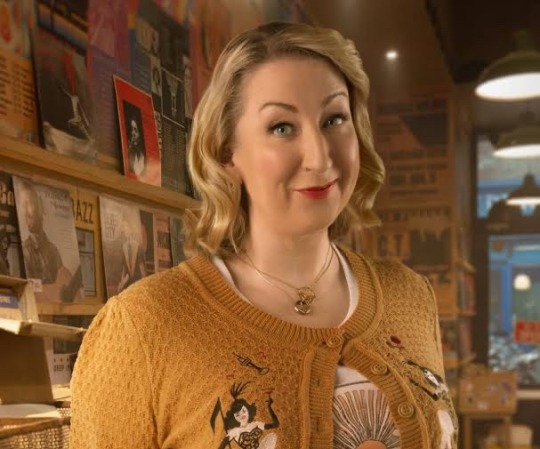
Maggie the Mirror
Maggie is a mirror for both Aziraphale and Crowley. Firstly, we associate her with Aziraphale. She owns a record shop instead of a bookshop, she’s sunshiney and strait-laced, even her appearance reminds us of Aziraphale. Plus, of course, she’s in love with the grumpy one. So far so good. But then we realise that Nina is a mirror for Aziraphale too— her abusive relationship is a lot like Aziraphale’s relationship with Heaven and Maggie, like Crowley, yearns and waits.
Read more under the cut
This alone—a switcharoo in the mirroring—is interesting and unusual (in a good way!) But it isn’t left in that place. After making the switch, after setting us up to think that Maggie = Crowley and Nina = Aziraphale we have a final and strong gesture towards Maggie being a mirror for Aziraphale after all—Nina calls Maggie “angel” right in front of Crowley himself.
What the hell?! How blatant can you get? Why do this now after the switcharoo?
Maggie is a mirror. But which character is she being held in front of: Aziraphale or Crowley?
It reminds me of this line from one of Crowley’s favourite songs:
“If I could make the world as pure
And strange as what I see
I'd put you in the mirror
I put in front of me.”
Is she somehow a mirror for both? Is that the point?
Maggie might not be human
And then we have the suggestions that Maggie is not entirely human. There are two key pieces of evidence for Maggie being something other than human.
Firstly, there’s her spelling error in the note to Aziraphale. She spells urgent as “ugrent” which later becomes significant when we find out that demons can’t spell. This suggests that Maggie is a demon.
It has been suggested that the spelling error might be explained as a Freudian slip as it puts the word “rent” into the word urgent. But this is not a good explanation. Freudian slips involve an unconscious preoccupation not a conscious one and secondly they don’t involve making a whole other unrelated mistake first in order to make the slip, ie Maggie had to write the “g” in the wrong place before she could slip in the “rent”.
More importantly, this is a work of fiction. What is the narrative purpose of including a Freudian slip? It is to tell the audience what is happening in the character’s unconscious. There’s no need to include a Freudian slip here because Maggie herself tells us about the rent directly. It is not a slip.
It has also been suggested that it could be part of the mirroring. But Neil has confirmed that Crowley can spell. So that doesn’t make sense either. Mirroring should point at Crowley directly not reference a demonic characteristic that he himself does not have.
The only plausible narrative purpose for including the spelling error is to make us wonder if Maggie might be a demon. Now that doesn’t mean that she definitely is a demon. It could well be a red herring! But it was deliberately and intentionally included and there’s just no other reason to have included it. We are meant to wonder if Maggie is a demon.
The second piece of evidence that Maggie is not human is the fact that two of Aziraphale’s miracles fail on her. When the demons storm the Bookshop, Aziraphale tries to use miracles to get Maggie to flee and to do whatever Crowley says. But she just blinks and asks if Aziraphale is trying to hypnotise her. Aziraphale’s miracles don’t fail (unless there is a miracle blocker around) so this is significant. Again, it isn’t proof. But it was included intentionally. We are meant to wonder why Aziraphale’s miracles fail on Maggie.
So, is Maggie a demon?
Possibly. But then we need to consider what that means for her conduct around the Bookshop. I don’t think the fact that she can step over the threshold and into the shop is a problem. She was invited, after all. But she does invite the demons outside into the shop and this works—once she says that they can enter. It could be the case that this is just how it works, that anyone invited into the Bookshop has the power to invite new people in. Or it could be that she herself had that power because it is a Heavenly embassy.
Wait? What? Is Maggie an angel then?
Maybe. It would explain why her invitation to the demons to enter the Bookshop gave them the ability to do so. It would also fit with Nina calling her an angel later on.
Angel? Demon? What else is there?
Angel and demon are not the only two possibilities. It has also been suggested that she could be a fictional character invented by the Metatron. We also know that witches exist in Good Omens (and we don’t entirely know what witches are or the limits of their powers). So she could be a witch. She could also be a human possessed by a demon.
What about her backstory?
We know that Maggie her family have had a long association with Aziraphale and his bookshop. If she is a demon or an angel this means that either she’s been in place as a spy for someone (the Metatron? God?) keeping an eye on Aziraphale for many years undetected by Aziraphale or Crowley or she’s been installed recently with the Book of Life or something else used to retrofit her backstory in. I do find the idea of an angel or a demon secretly having such a long association with Aziraphale without Crowley getting wise to it a bit odd. He’s pretty damn good at protecting his angel. But we also know that the body swap worked for Aziraphale and Crowley and that Crowley snuck into Heaven undetected. So, it is potentially in line with that. Especially if she was sent by the Metatron or God under their orders and protection. So maybe.
What is she doing then?
We know that Maggie: (1) set Aziraphale down a path of trying to get Nina to fall in love with her (which of course also prompted him to try to further his own relationship with Crowley), (2) invited the demons into the Bookshop bringing a safe enough situation to a dramatic head before Crowley could return, and (3) had the little chat with Crowley that primed him to confess his love to Aziraphale and respond as he did to Aziraphale sharing the Metatron’s offer.
I think we should take seriously two possibilities. One is that that she is in league with the Metatron, working under his orders. The other is the exact opposite: that she is trying to help Aziraphale and Crowley, to bring them together, perhaps at the bidding of God herself.
I don’t think it is possible to say exactly who or what Maggie is from season two alone. I don’t think we are meant to work it out yet, just to ask the questions. But I do think we will find out in season three.
#good omens#ineffable husbands#good omens meta#good omens analysis#Maggie#good omens season 2#good omens spoilers#gos2#good omens s2#my meta
152 notes
·
View notes
Text
kink that doesn't say it's kink
i never thought id have a full blog post in me about writing but ive been rotating this in my head for days and finally think i can put my thoughts down. obv this is all subjective and only relative to me, it's not a screed about how you should write. it's more a look into my thinking.
for the past like, two weeks, i've been trying to come up with a story that fit the title "bred and breakfast" and coming up miserably blank. because hard as i try i couldn't find my way into a story that was a) about a bed and breakfast b) involved breeding kink in the way i want to do it and c) did not look at the camera and go "today we're writing about someone engaging in breeding kink!"* and issue C is what i'm gonna talk about.
for me, the purpose of writing smut, particularly genre smut that isn't just two people in the regular world having sex, is to present a reader with a fantasy situation where their kink is a natural consequence of the narrative. a situation where the fantasy is not an imagined fantasy for the characters, but a lived reality. obviously there are exceptions and ways to work a character having a relevant kink into the narrative (ex: the xenosexuality conference, brilliant's explicit kink for being an object of curiosity feeding into her situation as an object of curiosity to a bunch of horny aliens), but generally i want my stories to be about sexy things happening without premeditation or the characters pointing out that the situation is constructed.
it's the difference between a story about a bdsm couple tying the sub to a wall and pretending he's a prisoner in a dungeon getting whipped and getting off on it, and a story about a sexy criminal being tied to a dungeon wall and getting whipped and getting off on it. they are ultimately the same thing. guy gets whipped and gets a boner. the latter just does away with the tools of constructing the fantasy (negotiating, safewords, aftercare) and serves you the fantasy direct as part of a larger narrative you can care about. why is the prisoner there? what is his relationship to the whipper that makes this erotic? what happens to him after they fuck? his answers to those questions are more interesting to me than the bdsm sub's.
but as i said, this is all highly subjective. maybe the bdsm couple is more your speed and that's fine. but nothing pulls me out of a narrative like a story going "we're going to do bdsm now!" if bdsm and the fact it Is bdsm are not vital to the narrative. i do not want the strapping stablehand to explain safewords to his master he's about to spank in a barn. just spank him without asking, because he doesn't respect you. spank him til he bleats like a sheep and understands how hard you work to take care of his lordship's horses. spank him because it's what he deserves, not because we're engaging in spanking kink.
and the challenge for me now is figuring out a convincing way to get a character on a breeding bench at a bed and breakfast without them going "i would like french toast and to be put on a breeding bench for big cow men to fuck please" because while that might be funny, and might be sexy, it doesn't make for a very compelling narrative.
*and i don't want help figuring it out. i'll get there on my own
221 notes
·
View notes
Text
I think jason is. a character that's impossible to fully make sense of on a narrative level bc he doesn't actually understand what he wants.... like. I think he's someone who... the first part of his life made sense to him, in that he was a poor kid with parents who were varying levels of broken and trying, and he did his best and kept his chin up and he was ultimately rewarded for it. even with all the skepticism in his little baby heart, we all know the myth of the american dream, and it's easy to let that make sense. and he worked so hard to be robin and be good and follow bruce's rules and apply himself in school, but he still saw bad things happening, cracks in the mask of justice that he couldn't make sense of, and it made it hard for him. and then his ultimate senseless injustice happened, and he died, far too young, betrayed and hurt and failed by everyone who loved him or who should have.
and I think when he came back he just like. couldn't figure out how to cope with that senselessness, so he crammed the experience into a narrative he could understand, where bruce wasn't good enough and didn't love him enough and won't ever choose right, won't make the hard decisions that have to be made to protect the people who are important.
but I think that narrative also isn't actually representative of what jason feels deep down? i don't think bruce killing the joker would have actually made him feel any better, or bruce finding some clever way to stop jason and save all three of them, or bruce apologizing to jason for failing him and saying how much he loved and missed him. I don't think any of that would have made any of it any better for jason, because I think what he's fundamentally grappling with isn't really the nature of any of his relationships, it's the fundamental injustice of the world and how totally nonsensical it is that terrible, brutal, hideous things can happen to innocent people for no reason (which really makes the joker a perfect perpetrator here, doesn't it?). I think he's ultimately somewhat of an idealist in that regard, and he lashes out at bruce about it both for personal reasons and because bruce has positioned himself as the embodiment of justice, and because bruce failed jason in that capacity and has frankly continued to fail gotham at large in that capacity.
which isn't really any particular fault of bruce's—if there's a perfect justice, I don't think we've found it yet, and someone is usually failed one way or the other no matter how ardently justice is pursued. which, as a sidenote, I think is why many of the best incarnations of batman are less about the pursuit to bring a criminal to justice and more about showing compassion and care to the victims of an injustice, whether individual, social, or circumstantial.
jason's effort to become a crime lord and a "better batman" was at least as much about his desire to prove that a meaningful form of justice exists as it was about his desire to hurt and spite bruce, and he was doomed to fail from the start in the way that I think we're all doomed to fail when we look to retributive justice to heal our wounds. he was looking for the comfort of a world that made sense to him, where he could understand what had happened to him and to gloria stanson and the many others like them, and ultimately that's not something he could ever have found in bruce. bruce, despite being his father figure and one of the greatest sources of comfort in his life before his death as well as someone who has positioned himself as a figurehead for justice in gotham, has only ever been a man, and he very clearly has never had all the answers where justice is concerned. no amount of his suffering or failure or apologies would have brought jason any peace, because what jason actually needed to (and was making clumsy attempts to) grapple with was the fact that the world is random and frequently cruel, and that "justice" is not and never has been an effective remedy to that state
#sage reads dc#sorry i just needed to braindump idk#ive been thinking a lot about jasom today and then an essay came out. whoops.#long post
280 notes
·
View notes
Note
I've started reading The Great Gatsby (I've fallen into the reading classical literature trap 😔. I really need to finish Crime and Punishment.)
Anyhow I think it's really interesting how Asagiri chose to characterize many of the people in BSD. Especially after learning that irl Fitzgerald was more of a cynical person (at least towards the end of his life) than his animated counterpart. And it made me think of all the other characters of the show and how their characterized.
What was Asagiri's purpose as he came together with these characters? Why'd he have some characters act as their irl counterparts while others act more like the characters they wrote or people in their lives?
These aren't really questions that I wanted the answers to they were moreso just thoughts that I had. I'd love to have a peek into this man's mind and how it works
I think a lot of us have fallen into that trap LMAO. This is my favorite topic though. I could talk about this forever because Kafka Asagiri is an interesting person who has integrated a lot of literature into this one series. I don't know what goes on in this man’s mind and I know these aren't literal questions, but I am interested in sharing what I know!
As you've pointed out, some characters do act more like the people in these works written by them than the actual people. BSD isn't purely just taking these authors, their relationships, and then implementing them just like that. it also takes these authors’ literary personas, their impact socially, and their works to make them into who they are. Asagiri is doing this because it makes it more interesting, but also imagine writing about this authors where most of them lived depressing lives with qualities that don’t make uh, the type of story you want to tell.
I’m impressed with how creative he is.
I’m trying to limit myself on how much I should talk about this, but I fear that I’ll leave out important bits about how Asagiri incorporates these people into the work. I’m also just jittering and excited. Like I almost forgot to bring up the fact the reason BSD has a war narrative is because it takes Japanese authors from Meiji to Shōwa era, so about the time Western influence kicked in, forcing them to modernize and keep up with the rest of the world during what is a fairly short time for huge development like this, to post-war Japan where, you know, the Occupation of Japan is happening and they have to intake the traumatic repercussions of everything before that.
This can make The Great War functionally WW2, but obviously not a one to one match. I’m not a historian or anything, but this should come to mind for anyone who’s in the know about some Japanese history. Now that I’m bringing it up though, Mori’s attitude during the flashback with Yosano is put into context because he pretty much says himself that he needs his country to realize that they keep up with the rest of the world and that the battlefield is changing, and real life Japan did not care about how they did that.
With N, Chuuya, and Stormbringer too. I’m almost hesitant to bring this up because it’s so serious, but yes, Japan did do lethal human experimentation for that same purpose to keep up with the rest of the world and prove themselves.
Ahh, I went off track. Sorry, we were talking about how Asagiri writes characters, right? There is a lot of crossover between the real authors and their writing, so it’s sorta hard to tell with people like Dazai where the work influence ends and the the real person begins.
For me currently in my classic lit research period, I’m almost upset at myself for barley reading anything by Ryuunosuke Akutagawa because he’s my favorite character. I’ve just been so caught up doing my Oda Sakunosuke essay that I don’t have too much time for other authors. I’ve also picked up “The Similitude of Blossoms: A Critical Biography of Izumi Kyōka” recently (and A New Hamlet by Osamu Dazai, but that’s not important).
Ah, how much should I talk about.… hmm… how about Chuuya as an example of Literary Voice vs Real Person…. Lucy Montgomery and Edgar Allen Poe for Social Impact (for Japan specifically)…. and then.. Oh whatever, I’ll figure it out. One day I’ll talk about Kyouka, but not now. I’d feel ill prepared.
If you’ve ever read a poem by Chuuya Nakahara, taken in the emotion and deep feeling, and then found any fun facts about his interactions with other authors, there’s a huge contrast between those two modes that can be jarring. Im sure you can tell how that carries over to BSD. I’m impressed by how Asagiri is able to balance both the brash attitude of Chuuya and the inner literary voice that voices the emotion and care he has in him.
Edgar Allen Poe is slightly more obvious than Lucy’s influence (or maybe it’s Lucy’s, ah it depends), but both pop out at you when it’s pointed out. He was one of the first American authors to be introduced to Japan and fairly popular, but mainly we would point to Edogawa Ranpo as the most blatantly influenced by him and who his name is quite literally attached to. While Lucy Montgomery isn’t attached to anyone in particular, Anne of The Green Gables was wildly distributed in Japan when there were few english children books and became a hit.
There’s a television series too if you search for it. Any redhead, pigtail-braided girl you see in some Japanese media is because of her! It’s probably why these two have the most presence in the story currently compared to other members of the Guild and work with the Agency at times.
There are times when Asagiri will use influences outside of the author’s own catalog to create them, some literary like Albert Camus’s The Stranger and The Myth of Sisyphus (in writing characters like Dazai or Fyodor, I could make a post about that), and some just of his own anime/manga interests in other series like Jojo, Cowboy Bebop, Black Lagoon, etc. if you’re familiar.
I’d feel bad if I don’t at least show one example of this so, how about an Odasaku example with The Long Goodbye by Reymond Chandler? I was going to avoid talking about him until the essay, but I can’t help myself. Many have pointed out these parallels before, but Asagiri did point it to be his favorite book last year in an interview.
If you’ve noticed that the presentation for Dark Era in the anime comes off like a Noir film just like how Untold Origins came off like a black and white samurai film, good job! The Long Goodbye is a Noir novel about a detective named Phillip Marlowe who is unable to let go of a case involving a friend that was accused of murdering his own wife, but supposedly commits suicide and confesses to it before Marlowe is able to leave custody. By the end of the book, he uncovers the real perpetuator (a past lover of Terry Lennox’s before he was ever called by that name) and finds out where Lennox really is by poking into the story of where the message he got was sent.
He comes in with a new look and identity, and he asks if it’s too early for a gimlet. They say their last few words to each other, Marlowe flipping back and forth from acknowledging him as Terry Lennox and as a person he never knew, and then Marlowe tells him that “he’s not here anymore”. Marlowe had already told him goodbye when it was sad and lonely, so Lennox does the same here. That ends that mutual, long goodbye and he never sees Lennox again.
The immediate response I’ve see about this is how it parallels the relationship between Dazai and Odasaku. In The Day I Picked Up Dazai, just like how Marlowe brings him to his home to clean him up and meet up at the same bar for the next few months of their friendship, Odasaku also does so with Dazai and drinks a Gimlet for reasons he doesn’t know. In reality, Gimlets are a representation of the friendship between Marlowe and Lennox as it’s Lennox’s favorite drink. It makes it a little painful when Marlowe ignores him when he ask to go get a gimlet at that same bar they always went.

BEAST is more hyper specific about it by having Dazai ask the same question that Lennox asks when he gets smoked out and Odasaku asking for a gimlet with no bitters, which is specifically how Lennox takes it. Odasaku does not drink the gimlet at all though, showing that there is not friendship to start or accept or say goodbye to, as Lennox does ask Marlowe to drink a Gimlet to say goodbye to him in the letter. Just like TDIPUD is like their beginning, BEAST is their ending without ending because BEAST Dazai is not the same person he was friends with.
Odasaku fulfills being a detective and Dazai is the tragic friend with a past he doesn’t say anything about. Great. Now what I think people are missing when they entirely focus on Odasaku and Dazai when they talk about Lennox and Marlowe is that Lennox is narratively also Andre Gide.
If we were to split Lennox into three people just like his three identities, this is what it would look like:
The Friend: You help him out and don’t judge for his faults, in turn you go out to a bar with each other. It’s uneasy, but it’s worth a lot to the both of you. Eventually you have to part ways in death. (Dazai & Terry Lennox)
The Unknown: Is he someone you know? He acts like it, but he looks nothing like what you’ve encounter before. Maybe in some world you were, but that’s not now and it’s too late for this goodbye to be playing out. You let it happened though and you never see him again when he walks out that door. (BEAST Dazai & “Señor Maioranos”)
The Soldier: The past is right around the corner and its come to bite you in the ass. White hair and war memories haunting him with a scar as a reminder, he’s a reflection of you but maybe not. Who knows? (Andre Gide & “Paul Marston.”)
The initials “P.M.” of both his past name and Phillip Marlowe’s is meant to clue in how Eileen (the past lover) is connected to Lennox by her thinking of Marlowe as her past lover as she attempts to seduce him in some trance. What I’m trying to note here though is that you can take this as Lennox being another reflection of himself. It’s easy to do that reading for both Dazai and Gide as they’re both his foils and are purposely similar, but Gide aligns more with this past identity than Dazai does and retains his white hair.
Uhhh, wasn't planning to make a mini-analysis in the middle of my talking but okay. I'm leaving it off there. I went blank a lot while writing because I didn’t know what I wanted to comment on. There's too much to say about this large cast. I have way more literary fun facts and ideas to say, but nah.
#bsd#bungou stray dogs#dazai osamu#mori ougai#bsd analysis#bsd meta#bsd edgar allan poe#bsd lucy#oda sakunosuke#odasaku#bsd beast#the day i picked up dazai#andre gide
57 notes
·
View notes
Text
Here’s Part 2 of some ideas I’m doodled for my Winx rewrite
Last post seemed to do better than I expected and I’m glad a few people enjoyed it. So here are some more things I want to work with.
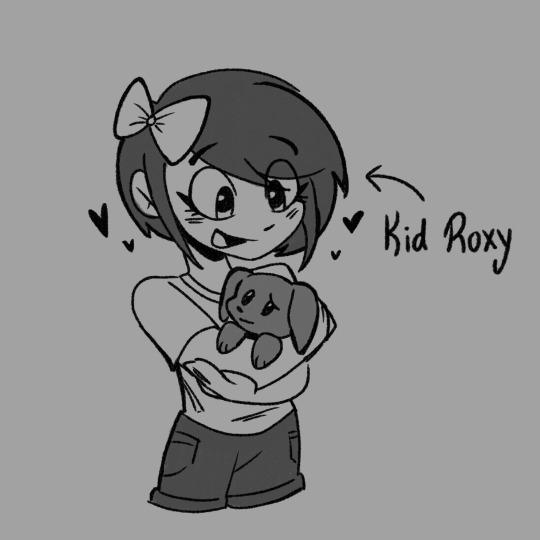
I like Artu and Roxy’s relationship but I would have also liked some backstory on them and more depth. Like Gantlos said “it’s just a dog”. How did Roxy get Artu? Is he adopted or bought? Is there a reason he doesn’t like anyone outside of Roxy and Klaus?
In my rewrite, yes. Abandoned as a puppy, a kid Roxy took him in after her mother left her dad unexpectedly. She basically raised Artu and he means a lot to her, but she never socialised him since she herself isn’t social with people (so while Artu may tolerate someone’s prescence he doesn’t like being touched or seen upclose). Roxy raising Artu is also why she gets pissed and earns her fairy form but doesn’t want the fairy gig since it ended up hurting her dog, because as a fairy the wizards are after her and Gantlos hurt Artu.
Speaking of Gantlos
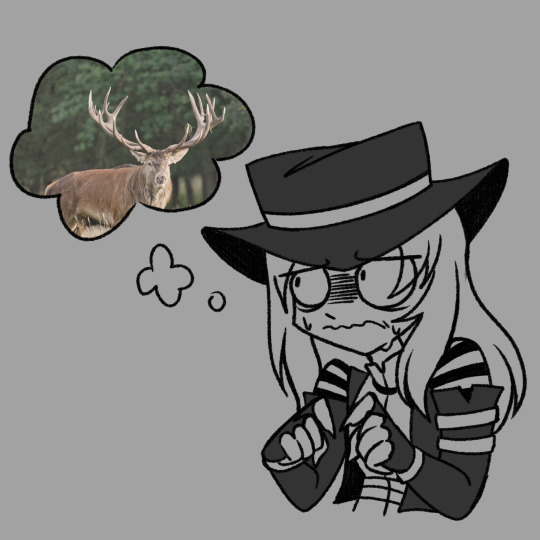
Gantlos my beloved you’re so fucking bland the only personality trait you have is having fucked up pointy hands and a cool hat <3
Ok in all honestly I like his apathy to animals and the Winx in general, but that also applies to the other wizards to some extent. At least you can say something about the other wizards; Orgon’s voice is top tier, Duman has really cool powers and design, Anagan’s banter with Flora’s entertaining. This one’s technically a headcannon I made cannon in the rewrite. I did my research btw.
Gantlos has a pretty intense fear of deers also called Elafiphobia, even asking Duman to not shapeshift into one. It’s pretty bad, seeing a deer gets him pretty close to a panic attack. I’m not going to spoil why but I’ll say it’s a consequence of the Great Fairy Hunt. In fact all the Wizards despite being the cause have been affected by the fairy hunt, either overall or because of a major event. Gantlos’ deer phobia is also why he doesn’t like/care about animals initially, I mean, why should he like them? Just cause they’re cute? Hah!
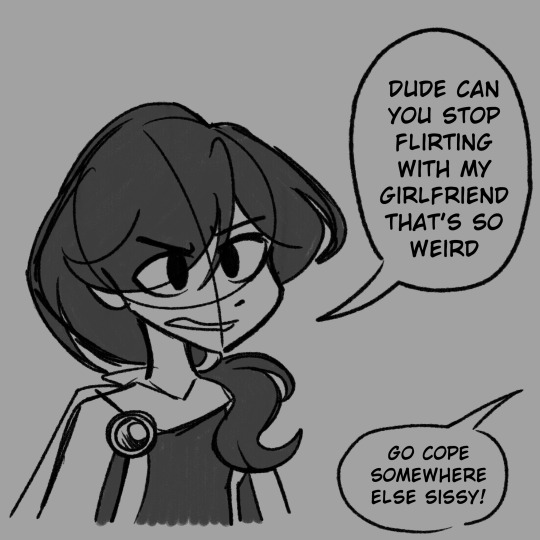
Apart from Riven and Musa I hate the melodrama in season 4 it’s so shit. Since in my version Sky isn’t in the story cause king stuff, Mitzi is narratively cremated and Nabu doesn’t die, on top of planning to expand on Anagan and Flora’s relationship as rivals and Anagan “flirting” with her, it’d be weird for Helia to be like “eh”. Like even if Flora can hold her own I think he’d at least be a little concerned and annoyed at Anagan.
So yeah, Helia’s conflict is having a case of Impostor syndrome because Anagan’s a foil to him; confident, extroverted, confrontational, and actually bounces off of Flora really well. (Like, I don’t ship Anagan and Flora but the people who do I don’t blame them, it sounds more interesting) Even if Flora doesn’t reciprocate Anagan’s feelings, Helia feels inadequate and is anxious Flora will lose interest and might even break up with him since he’s the anti-social poet of the group. Timmy could even help after his confidence arc in Season 2. He’s not overprotective of Flora like wanting to fight Anagan since it kinda goes against his pacifism but the narrative doesn’t care about that as much as I do :/
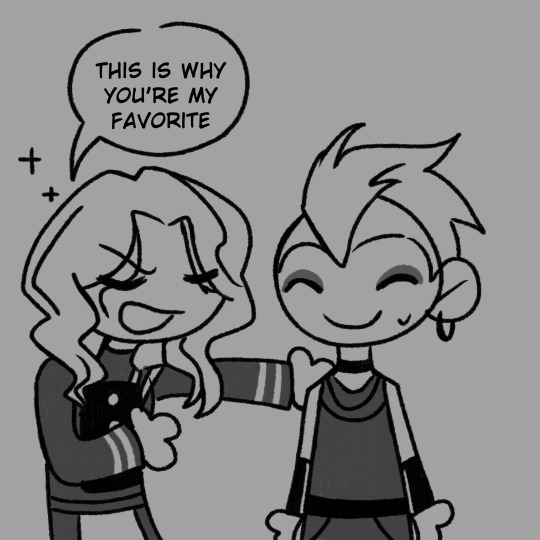
And lastly I think it’s be neat if we saw a more fleshed out dynamic between the Wizards, the best I can think of is when they’re protected by Syllia and Duman almost slips their plan to which Anagan says he’s being whoosy, Orgon complains about being protected by fairies while Gantlos is fine with it.
A lot of the rewrite is focused on fleshing out the wizards because I want complex villains grr, and they’re perfect for it. The Earth Fairies? They’re good but they’re dead in my rewrite soooo-
I like to think Orgon is pretty manipulative of them. Was he always like this? No, but he’s desperate to secure the disappearance of magic from Earth, and his manipulation gets worse and worse as the episodes go on, in the end being threats and guilt-tripping. He still cares but mostly how the wizards can be of service to the Black Circle. And yes Duman is his favorite because he has the best powers. Shapeshifting will always be OP and the best power in my heart.
Anyway that’s all folks. If I make a part 3 it’ll probs cover some other stuff like Jason Queen, which I like his character, it’s perfect for Musa’s development (until they made Bloom the fucking main singer like WHYYY) or perhaps talk about Klaus or Morgana, Tecna and Timmy and more about Nabu. Anyway I’ll go watch some more nostalgic minecraft videos and webtoon rants. See ya!
#winx club#winx rewrite#rewrite#winx roxy#winx gantlos#winx helia#winx orgon#winx duman#wizards of the black circle#winx specialists#art#fanart#digital art#doodles#fanfiction
63 notes
·
View notes
Text
Seeing posts about aroace mytho and I’d like to raise you my personal cherished headcanon that I hold near and dear to my heart: aromantic Duck.
So obviously people love shipping Duck so this headcanon won't catch on but hear me out. Duck's strongest relationships are (arguably) platonic ones.
Duck explicitly says she loves Mytho, yes, but as the show progresses that love becomes more evidently platonic. She admires Mytho but she doesn't want him, especially when compared with Rue. Her feelings for Mytho markedly change over the course of the first season. She stops blushing around him, stops imagining herself in a relationship with him. That initial attraction is replaced by a deep admiration and a desire to save him.

Her crush on Mytho could be read in a variety of ways--it could be physical attraction, comphet, or a simple desire to be close to him that has been misinterpreted as romantic feelings.
Beyond Mytho, she regards Rue as a beloved friend, and any indication that she may have feelings for Fakir may just easily be read as platonic. In fact, it's very telling that her closest relationship is with the person who becomes her best friend, rather than her star-crossed fairytale prince.
The part that hammers in the aromantic narrative for me is how, according to the story, Tutu's whole life is supposed to revolve around romantic love. She gives everything for her love until there is nothing left of her. Duck is simply fulfilling a role.
In the scene that struck me as the most aromantically coded Drosselmeyer tells Duck she "should" be in love with Mytho and want to marry him. She seems uncomfortable at this and looks away without responding. This leaves her feelings for Mytho up to interpretation, but personally I always read it as Duck is uncomfortable because she hasn't been thinking about marrying Mytho. She is unsure how to respond because she knows she is failing to perform her role as a Princess.

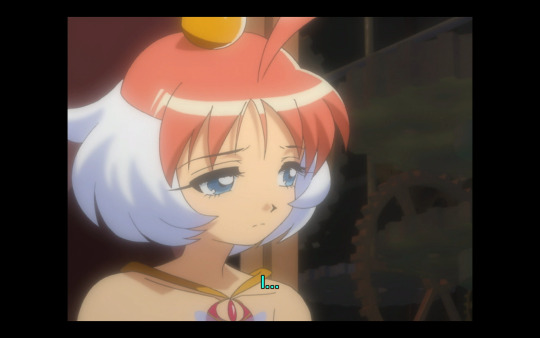
Drosselmeyer forces amatonormativity upon Duck and tries to reduce her whole role to her feelings for Mytho, expecting her to drop everything for him in a way that completely disregards her other important relationships. This is contrasted by how Duck's feelings for Mytho are so deeply tied to the fact that she became human for him. She is more upset at the prospect of returning to a duck and losing her friends and ability to dance than she is at losing Mytho's love.
I like taking the amatonormative narrative and twisting it to be an aromantic one. The story of Princess Tutu is about a girl who cannot confess her love in the "normal" way without completely losing herself. Duck works around this by finding unconventional ways to express love. She cannot confess a type of love she does not feel. And when Duck does find love it's an unconditional, no-pressure love that doesn't demand romance or reciprocation of her. She has stopped trying to perform relationships and is allowed to exist as herself. As a shoujo protagonist she is breaking the conventions of the genre by not "ending up" with anyone, but i find it a much more resonant ending than if she had ended up with her "Prince."
#fakiru are alloace for aroallo btw#anyways this post coming from me a bitch whos probably on the aro spectrum#lots of talk about love in this post but literally all the respect for loveless aro folks#princess tutu#lea talks#i love queerplatonic fakiru where he has romantic feelings for her and shes like this is my best friend fakir#and theyre both cool with it and happy
173 notes
·
View notes